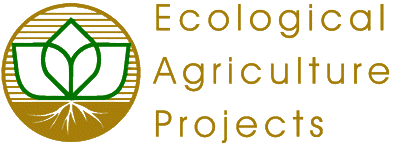

EAP Publications | Virtual Library | Magazine Rack | Search
Join the Ecological Solutions RoundtableEAP Publication - 30
by Stuart Hill
For most people in North America the world food situation seems far away. We may feel a little hungry occasionally, but few of us ever experience the devastating pain of real hunger or the crippling effects of severe malnutrition. Help tends to focus on single, direct, short-term, powerful (resource consumptive), authored solutions such as sending food, miracle plant varieties, machinery, fertilizers, and pesticides.
As many- have noted, such approaches increase dependence and debt, erode natural capital (soil, water and local species) and exclude most of us from making useful contributions.
As an alternative I would like to propose an approach to which you and I can contribute. It emphasizes multifaceted (holistic), indirect, long-term, low-power (individual, subtle and catalytic), and anonymous strategies. But first let us examine the nature of the problem.
Ecologically, the problem is caused, by an imbalance between people (their numbers, distribution and activities) and resources (food-producing systems, including all the inputs). Each region, or bioregion, has a particular carrying capacity, which is a measure of the amount of life, including humans, that it can support. When demands are such that a region's carrying capacity is exceeded, then its capital (its renewable and nonrenewable resources) and its carrying capacity decline. Certain technological intrusions and patterns of world trade, together with ignorance and greed, have reduced the carrying capacity of -many regions of the world. This reduction, combined with increasing population, can only spell disaster if allowed to continue.
In industrialized countries, we have become accustomed to relying on instant technological, or "magical bullet," solutions to problems. While these may give short-term relief, in the long term they usually worsen the problem. Thus, powerful cultivation equipment often increases soil erosion, and pesticide use is always followed by pest resurgence, pest-resistant strains and environmental contamination. Efforts to reduce the negative effects of such interventions tend to focus on efficiency (for example, more appropriate implements and more discriminate pesticide use) and on substitution of less harmful materials and practices (for example, biological pest controls). While such efforts appear beneficial, by focus ing on symptoms (soil erosion, pest outbreaks, etc.) they divert attention from the underlying causes--the design of our food-producing systems and the nature of our external and internal relationships. Current solutions tend to be purchased and externally applied (for example, pesticides and soluble fertilizers). Furthermore, by using such solutions we come to picture ourselves separate from, and on the outside of, the system. What we need instead are food system designs in which problems are prevented or solved internally, if and when they arise, and that place humans within the system, thereby increasing our bonding with the planet.
In other words, we need sustainable agroecosystem designs that have nourishment and fulfillment of local peoples as their primary goals and that place humans within the system. Such an approach puts into question most of the dominant economic and political systems with which we are familiar. Hard as it may be to wean ourselves from them, if such systems are not sustainable, as I contend they are not, the sooner we initiate the process of abandoning them the better.
How can we as individuals do both this and develop the necessary abilities to implement sustainable alternatives7 Firstly, we should obtain as much information as we can about how the natural system functions. One approach is to choose an animal or plant that really interests you and study it until you can almost take on its identity. Secondly; spend time within the natural environment. Go for walks in the woods, go camping, take time to pause and listen, notice the many changes that take place during the year; as a result, you'll begin to form a bond between yourself and the planet. Further, start to investigate your own psyche. Join a human development group that is involved in helping individuals to shed the patterned behaviours that keep us powerless and trapped in life styles that deep down we know don't make sense.
Gradually, you will find that you are' choosing not to go along with things that before you didn't question, or that you felt powerless to change. Perhaps you will learn to live locally and thereby reduce your dependence on distant resources. Gradually your vision of a sustainable, rational life style will develop, as will your awareness of the implications of your actions. You will begin to recognize the types of knowledge and skills that you really need, and the institutional structures that can help you to implement your visions. Get together with others to share your thoughts about such things, and your skills. In this way, we can cooperatively ensure the survival of our species.
When we place ourselves "within" the planet and tune into it, we will find that we will adjust our numbers, distribution and activities so that they remain in balance with the environment. We will discover that the Earth has far more potential than we had ever realized. We will also discover our own endless creative potential. These two discoveries are the essential prerequisites for arriving at realistic solutions to the world food problem, which will disappear as an indirect effect of achieving a balanced relationship with the planet.
Stuart Hill is an associate professor of entomology at McGill University in Montreal.
Copyright © 1984 Ecological Agriculture Projects
Info Request | Services | Become EAP Member | Site Map
Give us your comments about the EAP site
Ecological Agriculture Projects, McGill University (Macdonald
Campus)
Ste-Anne-de-Bellevue, QC, H9X 3V9 Canada
Telephone:
(514)-398-7771
Fax:
(514)-398-7621
Email: eapinfo@macdonald.mcgill.ca
To report problems or otherwise comment on the structure of this site, send mail to the Webmaster